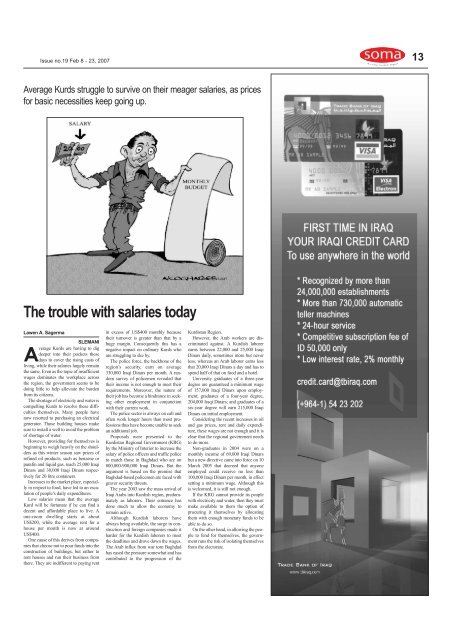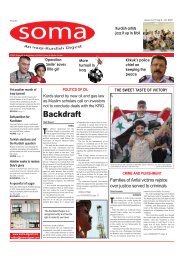Turkish interference A peaceful Ashura - Soma Digest
Turkish interference A peaceful Ashura - Soma Digest
Turkish interference A peaceful Ashura - Soma Digest
You also want an ePaper? Increase the reach of your titles
YUMPU automatically turns print PDFs into web optimized ePapers that Google loves.
Issue no.19 Feb 8 - 23, 2007<br />
Average Kurds struggle to survive on their meager salaries, as prices<br />
for basic necessities keep going up.<br />
The trouble with salaries today<br />
Lawen A. Sagerma<br />
SLEMANI<br />
Average Kurds are having to dig<br />
deeper into their pockets these<br />
days to cover the rising costs of<br />
living, while their salaries largely remain<br />
the same. Even as the topic of insufficient<br />
wages dominates the workplace across<br />
the region, the government seems to be<br />
doing little to help alleviate the burden<br />
from its citizens.<br />
The shortage of electricity and water is<br />
compelling Kurds to resolve these difficulties<br />
themselves. Many people have<br />
now resorted to purchasing an electrical<br />
generator. Those building houses make<br />
sure to install a well to avoid the problem<br />
of shortage of water.<br />
However, providing for themselves is<br />
beginning to weigh heavily on the shoulders<br />
as this winter season saw prices of<br />
refined oil products, such as benzene or<br />
parafin and liquid gas, reach 25,000 Iraqi<br />
Dinars and 30,000 Iraqi Dinars respectively<br />
for 20 litre containers.<br />
Increases in the market place, especially<br />
in respect to food, have led to an escalation<br />
of people’s daily expenditures.<br />
Low salaries mean that the average<br />
Kurd will be fortunate if he can find a<br />
decent and affordable place to live. A<br />
one-room dwelling starts at about<br />
US$200, while the average rent for a<br />
house per month is now at around<br />
US$400.<br />
One cause of this derives from companies<br />
that choose not to pour funds into the<br />
construction of buildings, but rather to<br />
rent houses and run their business from<br />
there. They are indifferent to paying rent<br />
in excess of US$400 monthly because<br />
their turnover is greater than that by a<br />
huge margin. Consequently this has a<br />
negative impact on ordinary Kurds who<br />
are struggling to eke by.<br />
The police force, the backbone of the<br />
region’s security, earn on average<br />
330,000 Iraqi Dinars per month. A random<br />
survey of policemen revealed that<br />
their income is not enough to meet their<br />
requirements. Moreover, the nature of<br />
their job has become a hindrance in seeking<br />
other employment in conjunction<br />
with their current work.<br />
The police sector is always on call and<br />
often work longer hours than most professions<br />
thus have become unable to seek<br />
an additional job.<br />
Proposals were presented to the<br />
Kurdistan Regional Government (KRG)<br />
by the Ministry of Interior to increase the<br />
salary of police officers and traffic police<br />
to match those in Baghdad who are on<br />
800,000-900,000 Iraqi Dinars. But the<br />
argument is based on the premise that<br />
Baghdad-based policemen are faced with<br />
graver security threats.<br />
The year 2003 saw the mass arrival of<br />
Iraqi Arabs into Kurdish region, predominately<br />
as laborers. Their entrance has<br />
done much to allow the economy to<br />
remain active.<br />
Although Kurdish laborers have<br />
always being available, the surge in construction<br />
and foreign companies made it<br />
harder for the Kurdish laborers to meet<br />
the deadlines and drove down the wages.<br />
The Arab influx from war torn Baghdad<br />
has eased the pressure somewhat and has<br />
contributed to the progression of the<br />
Kurdistan Region.<br />
However, the Arab workers are discriminated<br />
against. A Kurdish laborer<br />
earns between 22,000 and 25,000 Iraqi<br />
Dinars daily, sometimes more but never<br />
less, whereas an Arab laborer earns less<br />
that 20,000 Iraqi Dinars a day and has to<br />
spend half of that on food and a hotel.<br />
University graduates of a three-year<br />
degree are guaranteed a minimum wage<br />
of 157,000 Iraqi Dinars upon employment;<br />
graduates of a four-year degree,<br />
204,000 Iraqi Dinars; and graduates of a<br />
six-year degree will earn 215,000 Iraqi<br />
Dinars on initial employment.<br />
Considering the recent increases in oil<br />
and gas prices, rent and daily expenditure,<br />
these wages are not enough and it is<br />
clear that the regional government needs<br />
to do more.<br />
Non-graduates in 2004 were on a<br />
monthly income of 69,000 Iraqi Dinars<br />
but a new directive came into force on 10<br />
March 2005 that decreed that anyone<br />
employed could receive no less than<br />
100,000 Iraqi Dinars per month, in effect<br />
setting a minimum wage. Although this<br />
is welcomed, it is still not enough.<br />
If the KRG cannot provide its people<br />
with electricity and water, then they must<br />
make available to them the option of<br />
procuring it themselves by allocating<br />
them with enough monetary funds to be<br />
able to do so.<br />
On the other hand, in allowing the people<br />
to fend for themselves, the government<br />
runs the risk of isolating themselves<br />
from the electorate.<br />
13



